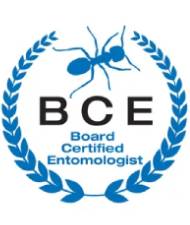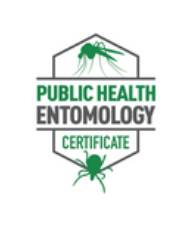How to Identify Bug Bites in Kansas City
What Just Bit Me? A Bug Bite in Kansas City
Bug bites in Kansas City. Many biting insects thrive in warmer weather. Mosquitoes, fleas, and ticks are common culprits during these months. While bed bugs can be a year-round nuisance, their impact often intensifies with increased summer travel. Contrary to popular belief, these pests don’t bite for self-defense; they feed on blood. Although some insect bites merely cause itching, others pose more serious health risks, such as West Nile virus and Lyme disease. This guide to identifying bug bites can help you address potential health or home issues promptly. More information can be found at PestWorld.org.
Lone Star Tick Bug Bites in Kansas City
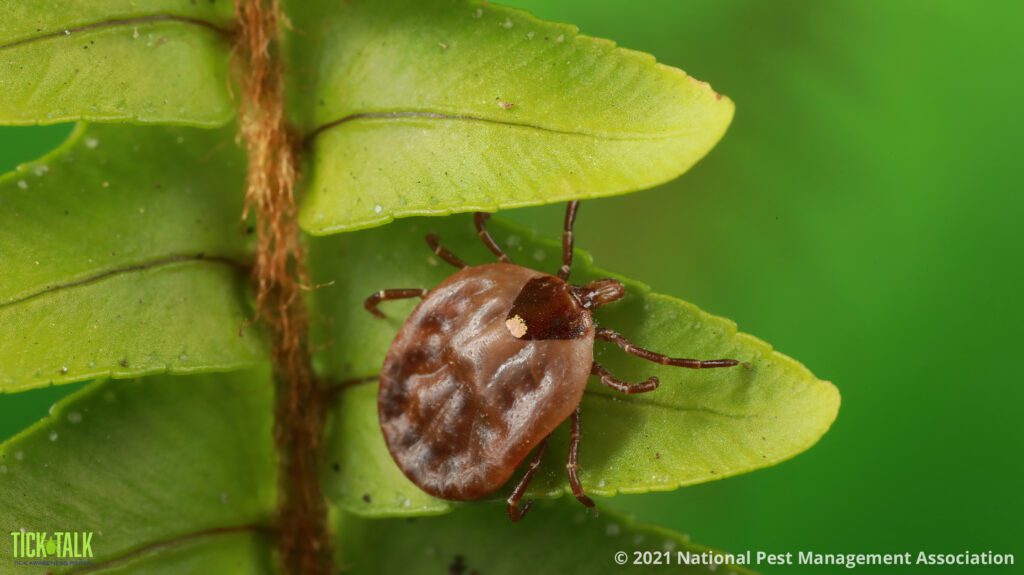
Ticks are blood-sucking arachnids, often found in wooded or grassy areas. Unlike insects, they have eight legs. Common tick species include the American dog tick, black-legged deer tick, lone star tick, and Rocky Mountain wood tick. Unfed adult ticks are typically flat, oval, and small, resembling a sunflower seed.
Habitat
These arachnids thrive in environments with abundant vegetation.
Bite Identification
The clearest sign of a tick bite is a visible tick attached to the skin. A distinctive expanding bullseye rash may indicate Lyme disease.
Health Risks
Ticks are vectors for several diseases, including Lyme disease, babesiosis, Rocky Mountain spotted fever, and anaplasmosis.
Prevention
After spending time outdoors, thoroughly inspect yourself for ticks. If you find one, remove it carefully and dispose of it properly.
Interesting Fact
Blacklegged deer ticks can survive without food or water for up to 200 days
Bed Bugs Bite in Kansas City
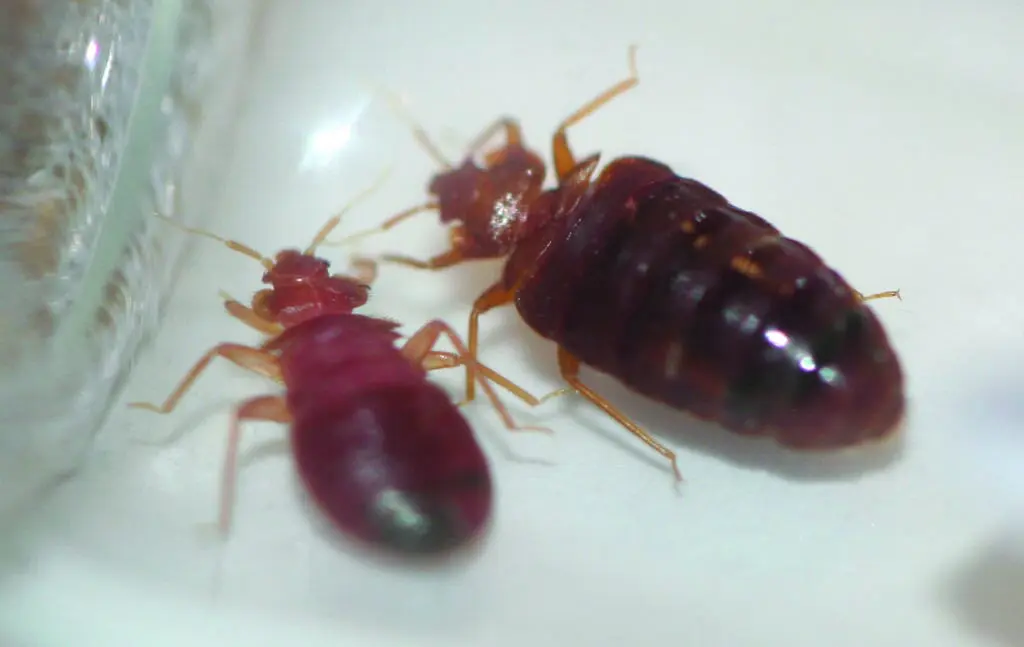
Overview
Bed bugs are parasitic insects notorious for infesting sleeping areas. These flat, oval-shaped bugs are typically reddish-brown but darken after feeding on human blood. Adults measure about a quarter-inch long, expanding in size after a meal.
Habitat
Highly adaptable, bed bugs are expert hitchhikers, often transported in luggage or personal belongings. While commonly found near beds and mattresses, these elusive pests can hide in various concealed areas, including baseboards, electrical outlets, and furniture.
Bite Marks
Bed bugs primarily feed on exposed skin during sleep, often targeting legs and arms. Bite reactions vary, with some people experiencing itchy red welts and others showing no visible signs.
Health Risks
Unlike many other pests, bed bugs do not transmit diseases. However, their saliva can trigger allergic reactions in some individuals.
Prevention
To prevent infestations, carefully inspect secondhand furniture before bringing it into your home. Look for signs of bed bugs, such as small, dark fecal spots or shed skins.
Interesting Fact
These insects have remarkable feeding capabilities, consuming up to seven times their body weight in a single blood meal.
Mosquito Bug Bites in Kansas City
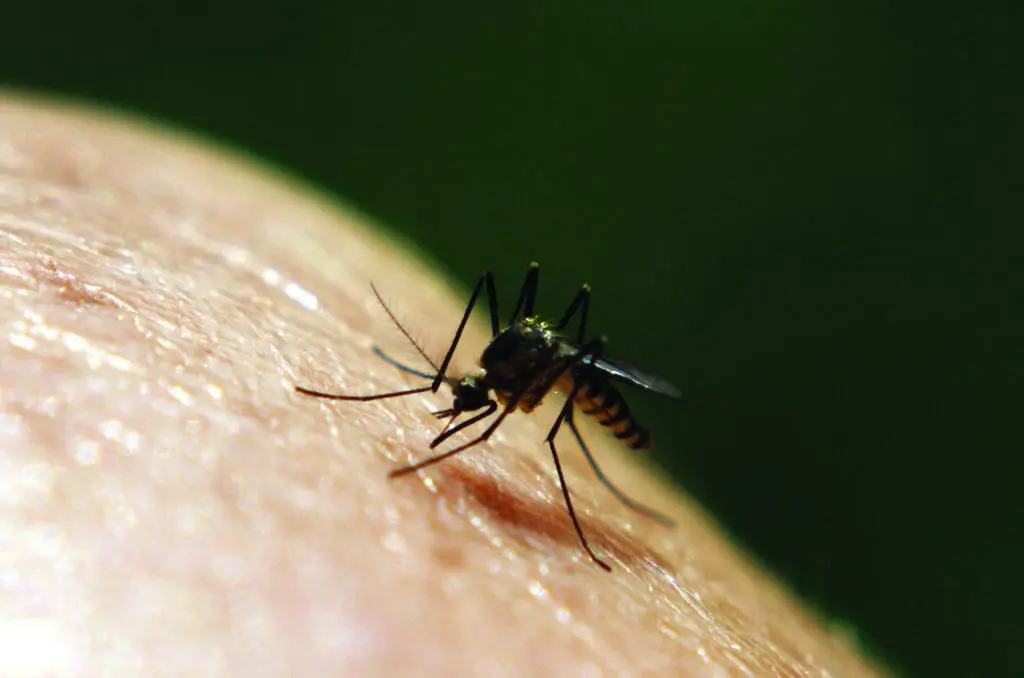
Overview
Mosquitoes are notorious summertime pests, and there are over 170 species in North America. These insects typically exhibit brown, gray, or black bodies adorned with white, silver, green, or iridescent blue scales.
Habitat
Water is essential for mosquito reproduction. Consequently, these insects thrive near various water bodies, ranging from expansive wetlands to small backyard containers.
Bite Marks
Human skin is a common target for mosquito bites, resulting in characteristic red, itchy welts.
Health Risks
Mosquitoes are significant carriers of diseases. In the United States, they transmit viruses like West Nile, Eastern Equine Encephalitis, and Dengue. Globally, their impact is even more severe, spreading diseases such as malaria, yellow fever, and Chikungunya.
Mosquitoes: Silent Carriers of Heartworm
Mosquitoes pose a serious threat to dogs beyond itchy bites. As these pests feed on infected dogs, they transmit microscopic heartworm larvae. Once inside a healthy dog, these larvae mature into adult worms, wreaking havoc on the heart, lungs, and blood vessels. The consequences of heartworm disease can be devastating, leading to severe illness and even death if left untreated. To protect your canine companion, it’s crucial to prevent mosquito bites through the use of effective heartworm prevention medication prescribed by your veterinarian. Regular testing is also recommended to detect the disease early. By taking proactive steps, you can safeguard your dog’s health and enjoy worry-free outdoor adventures.
Prevention
Reducing mosquito populations begins with eliminating their breeding sites. Removing stagnant water from containers like flowerpots, birdbaths, and buckets is crucial for prevention.
Interesting Fact
Only female mosquitoes bite humans. They locate their prey through a combination of body heat and carbon dioxide detection.
Flea Bug Bites in Kansas City
Overview
Fleas are parasitic insects that survive by consuming the blood of warm-blooded animals. The cat flea is a prevalent species often found in cats, dogs, and humans. Adult fleas typically have a dark reddish-brown appearance and measure between 1/12 and 1/6 inch in length.
Habitat
Fleas are adept at transportation, often hitching rides on pets, rodents, or wildlife such as opossums, raccoons, and skunks. While cat fleas commonly reside on their hosts, other flea species may exhibit different behaviors.
Bite Marks
Flea bites result in itchy, red bumps on the skin. Additionally, flea saliva can trigger severe allergic reactions in pets, known as flea allergy dermatitis.
Health Risks
Fleas pose health risks, acting as carriers for diseases like the rare bubonic plague and murine typhus. They also serve as intermediate hosts for tapeworms.
Prevention of Bug Bites in Kansas City
Effective flea management is essential for pet health. Regular bathing, grooming, annual veterinary check-ups, and the use of flea treatments during warmer months can help protect pets from infestations.
Interesting Fact
Fleas possess extraordinary jumping abilities, capable of leaping up to 8 inches—equivalent to a human jumping over a skyscraper. These are amazing feet for these tiny insects. Would you agree?

Jeffery Preece, BCE,PHE
Jeffery Preece is the Owner and Technical director at ZipZap Termite & Pest Control


